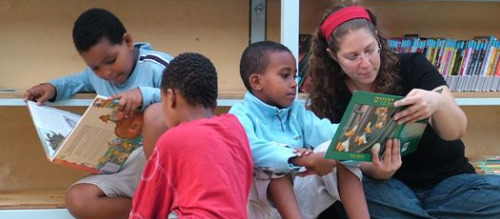An Israeli artists’ collective has created a safe garden of words where foreign workers and their children can savor the joys of literature.

Jews are known as ‘people of the book,’ and many Israeli Jews put special emphasis on reading and education. But when refugees and migrant workers come to Israel, they tend to fall through the cracks. Their kids attend Israeli schools and learn Hebrew, but with limited or no access to the public library these marginalized people aren’t exposed to literature and the power of the written word.
When a collective of Israeli artist types was looking to express itself in the urban environment, it dreamed up the Garden Library. Now open on Saturdays and Sundays in the south Tel Aviv neighborhood of Neve Sha’anan, where a majority of refugees and foreign workers live, the Arteam collective created two outdoor garden libraries in Levinsky Garden – one for small children, and one for adults.
The children’s library contains hundreds of books in Hebrew and opens like a pair of leaves, with the walls of the library folding down to create a soft parquet floor where the children can sit. The library for adults faces the kids’ collection and offers thousands of books in various foreign languages. Subjects include how-to books, as well as novels and non-fiction.
Staffed by four volunteers, the Arteam group says its aim is to serve Israel’s most insecure and transitory communities. There are an estimated 85,000 legally employed foreign workers in Israel, and 400,000 illegal workers. They come from countries far and wide and serve Israel’s agricultural sector, work in construction, and are important household aides and companions to Israel’s elderly. With their time in Israel ranging from a few months to years, one can find people from Turkey, Philippines, Thailand, Romania, Sudan and Eritrea in areas of south Tel Aviv.
The Arteam team includes artists Romy Achituv, Marit Benisrael, Yoav Meiri, Hadas Ophrat, Nimrod Ram and Tali Tamir. ISRAEL21c spoke with multi-disciplinary artist and writer Benisrael about the concept.
A space free of fear
“We founded a group of about seven or eight people – some of us are artists and writers; there is an art curator with us and an architect,” she says, explaining that they had an urge to develop an urban project with the elements of art and community. Two years ago they started thinking and one member – the architect Meiri – said that he wanted to build a library for foreign workers.
At first the group thought about renovating a building, but after a brief survey they found the options in the area to be run-down and depressing. In addition, foreign, illegal workers in Israel are suspicious about entering a gathering place for others like them that has a door; for fear that the authorities may be waiting inside.
A library in a community space like a public park seemed the perfect solution. “On Shabbat, Park Levinsky is full of foreign workers and refugees and we thought why shouldn’t we come to them?” says Benisrael.
A microcosm of the world
Since the opening of the library a few weeks ago, Israeli book publishers have been generous, and include Yedioth Aharonoth (also the publisher of Israel’s leading Hebrew-language daily), which has donated new books of high quality to stock the library that anyone can join for a deposit of 30 shekels (about $7.50).
Those who don’t wish to pay the deposit are free to sit and read for as long as they like. Will they be creating more garden libraries around the country? Benisrael says that that’s not the group’s ‘cup of tea’. “The idea was to create it and move on,” he responds.
The library has a unique emotion-based cataloguing system, where previous readers rate books according to three categories: Happy, sad, or inspiring. That’s one of the artistic elements that developed from the Garden Library, says Benisrael. “The idea is that the books will wander in the library like people do in the world, and that every person can change something,” she concludes.











